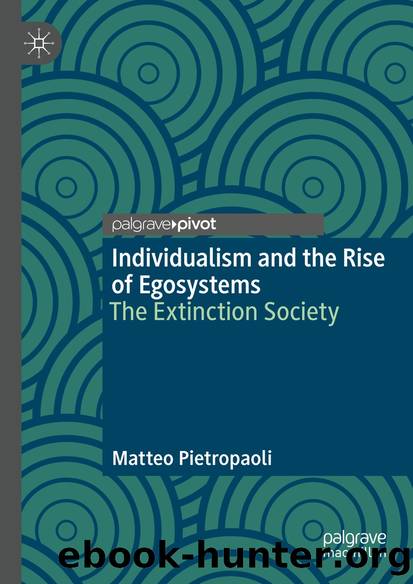Individualism and the Rise of Egosystems by Matteo Pietropaoli

Author:Matteo Pietropaoli
Language: eng
Format: epub
ISBN: 9783031252815
Publisher: Springer Nature Switzerland
3 Global Risk and Subjective Risk
We have seen the impact on democratic societies of the change that has taken place in issues such as those of responsibility and trust. These issues are precisely those which Beck intimately connects to the central question of âriskâ, and therefore of existential security, to the point that their change has established the passage to a new modernity. This second modernity, compared to the first one, characterized by the nation-states and the link with the territories, by mass consumption and political participation, by the doctrine of growth and progress, by the centrality of the West, according to Beck (1999), is considered to be the first truly global society, however identified as a âworld risk societyâ. This characterization is linked to multiple factors, the main one being the fading of relationship with risk in terms of control, insurance and limitation.
Every society has always had to deal with more or less extensive and manageable risks, against which to insure itself and on the basis of which policy and structures of control are also defined. Starting from the second modernity for Beck (which begins around the 1980s), globalization entails the expansion on a world scale of risks, not only in terms of such seriousness that private insurance companies do not take them on (nuclear accidents, pandemics, climate change), but also in terms of the interrelationships of growth and control. The large interconnected global village, with its market, its migrations, its wars and more, is in fact uncontrolled and ungoverned. Or more specifically, it is partially oriented, limited or stimulated, without the responsibility of return and democratic trust, by transnational technocratic bodies, which manage its fate in the dual role of self-appointed elites and sorcererâs apprentices. Because, even net of the detachment and disinterest for ordinary citizens, the epistemic communities and transnational ruling classes move themselves, as seen above, in a landscape of uncertainty and misunderstanding with respect to the developments of such complex, threatening and apparently unsolvable dynamics (firstly climatic disaster). âThe concept of âworld risk societyâ draws attention to the limited controllability of the dangers we have created for ourselvesâ (Beck, 1999, p. 6).
In this âreflexive modernizationâ, as Beck defines the process of second modernity, where globalization is accompanied by individualization, by the issue concerning the future of democracy and the state form, as well as by global threats, risk is what defines politics, as principles and ideologies once did. This, in part, seems to recall Inglehart (2018), who warned about the changing set of values ââand beliefs in the scenario of even a perceived socio-economic decline, following a system linked to growth, progress and confidence in the future. Even in a landscape of post-materialism, by now bound to the cultural characteristics of individualism, autonomy and self-expression, the individuals of advanced societies constantly deal with risk in terms of security and insecurity: personal, social, economic, global. Thus the definition of risk becomes, once the great total narratives have disappeared, the instrument of political affirmation par excellence, namely the underlying ideological reference in the post-ideological era.
Download
This site does not store any files on its server. We only index and link to content provided by other sites. Please contact the content providers to delete copyright contents if any and email us, we'll remove relevant links or contents immediately.
| Anthropology | Archaeology |
| Philosophy | Politics & Government |
| Social Sciences | Sociology |
| Women's Studies |
Born to Run: by Christopher McDougall(7127)
The Leavers by Lisa Ko(6948)
iGen by Jean M. Twenge(5415)
Sapiens by Yuval Noah Harari(5370)
Spare by Prince Harry The Duke of Sussex(5196)
The Kite Runner by Khaled Hosseini(5179)
Machine Learning at Scale with H2O by Gregory Keys | David Whiting(4313)
Bullshit Jobs by David Graeber(4190)
Never by Ken Follett(3956)
Goodbye Paradise(3810)
Livewired by David Eagleman(3772)
Fairy Tale by Stephen King(3396)
A Dictionary of Sociology by Unknown(3085)
Harry Potter 4 - Harry Potter and The Goblet of Fire by J.K.Rowling(3073)
The Social Psychology of Inequality by Unknown(3031)
The Club by A.L. Brooks(2925)
Will by Will Smith(2919)
0041152001443424520 .pdf by Unknown(2845)
People of the Earth: An Introduction to World Prehistory by Dr. Brian Fagan & Nadia Durrani(2736)
